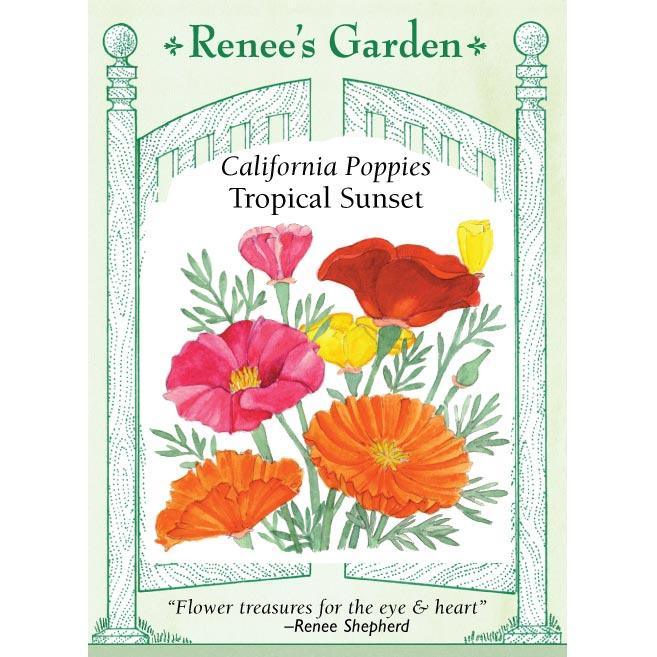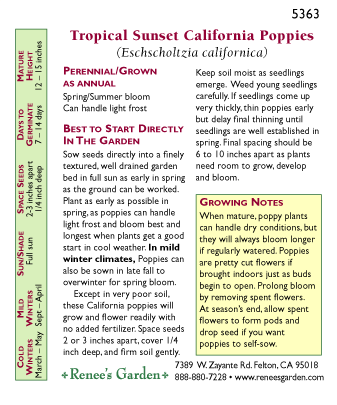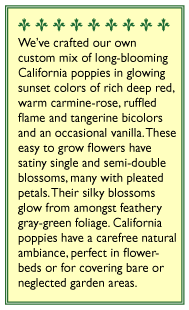Item Number: SWF5363
Tropical Sunset California Poppy Flower Seeds
Everything You Could Ever Want in a Mix
Poppy (California) - Tropical Sunset- Eschscholtzia californica
Perennial/ Grown as Annual - Mix of long-blooming California poppies in glowing sunset colors of rich deep red, warm carmine-rose, ruffled flame and tangerine bicolors and an occasional vanilla. These easy-to-grow flowers have satiny single and semi-double blossoms, many with pleated petals. Their silky blossoms glow from amongst feathery gray-green foliage. California poppies have a carefree natural ambiance, perfect in flowerbeds or for covering bare or neglected garden areas.
Soil & Water:Sow seeds directly into a finely textured, well-drained garden bed in full sun as early in spring as the ground can be worked. Keep soil moist as seedlings emerge. When mature, poppy plants can handle dry conditions, but they will always bloom longer if regularly watered.
Planting & Growing: Plant as early as possible in spring, as poppies can handle light frost and bloom best and longest when plants get a good start in cool weather. In mild winter climates, poppies can also be sown in late fall to overwinter for spring bloom. Except in very poor soil, these California poppies will grow and flower readily with no added fertilizer. Space seeds several inches apart, cover 1/4" deep and firm soil gently. Weed young seedlings carefully. If seedlings come up very thick, thin poppies early but delay final thinning until seedlings are well established in spring. Space seedlings 6" apart as plants need room to grow and bloom.At season's end, allow spent flowers to form pods and drop seed if you want poppies to self-sow for next year's spring flowers.
Soil Temperature: above 50°FPlanting Depth: 1/4"
Germination: 7-14 Days
Height At Maturity: 12-15"
Sun/Shade: Full Sun
Spacing After Thinning: 6"
Approx Seeds per Pack: Approx. 1275 Seeds
Check Your Zone Compatibility:
Compatible with your zone.
Growing Zone for

Our Guarantee To You
Since 1976, we've served our customers at every stage of growing. Please contact us at any time. We are happy to support and assist you.
Shipping Information
Shipping Information
Shipping Weight: 0.01 lb
Dimensions: 4.5"L x 3.125"W x 0.1"H
Features
Features
- Attracts Bees/Butterflies
- Does Not Require Support
- Good Cut Flower
- Good for Naturalizing
- Heat Tolerant
- Open-Pollinated
- Requires Summer Water
- Somewhat Drought Tolerant
- Useful for Ornamental
Characteristics
Characteristics
Planting & Care
Planting & Care
Soil & Water:Sow seeds directly into a finely textured, well-drained garden bed in full sun as early in spring as the ground can be worked. Keep soil moist as seedlings emerge. When mature, poppy plants can handle dry conditions, but they will always bloom longer if regularly watered.
Planting & Growing: Plant as early as possible in spring, as poppies can handle light frost and bloom best and longest when plants get a good start in cool weather. In mild winter climates, poppies can also be sown in late fall to overwinter for spring bloom. Except in very poor soil, these California poppies will grow and flower readily with no added fertilizer. Space seeds several inches apart, cover 1/4" deep and firm soil gently. Weed young seedlings carefully. If seedlings come up very thick, thin poppies early but delay final thinning until seedlings are well established in spring. Space seedlings 6" apart as plants need room to grow and bloom.At season's end, allow spent flowers to form pods and drop seed if you want poppies to self-sow for next year's spring flowers.
Useful Information
Useful Information
Guarantee
Guarantee
Share






